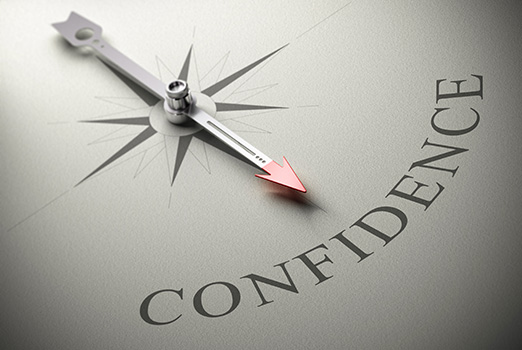PRACTICING LAW WITH CONFIDENCE
Self-confidence is a vital attitude which allows individuals to have positive yet realistic views of themselves, their lives, and their daily situations. Self-confident people have developed the ability to trust their own capabilities, gained a general sense of control in their lives, and learned to believe that, within reason, they will be able to do what they wish, plan, and expect. Even when life is rough, or in the face of setbacks or unmet expectations, self-confident people continue to be positive and accepting of themselves.
Self-confidence is not necessarily a general characteristic which pervades all aspects of a person’s life. Typically, individuals will have certain areas of their lives where they feel quite confident, e.g. social relationships, athletics, but at the same time have problems feeling confident in other areas, e.g. academics, public speaking, personal appearance. Many factors affect the development of self confidence. In childhood, parents’ attitudes are crucial. If one or both parents are excessively critical or demanding, or if they are overprotective and discourage moves toward independence and self-acceptance, children may come to believe that they are incapable, inadequate, or inferior. On the other hand, parental encouragement of self-reliance and full acceptance of children when they make mistakes or fail, help children to accept themselves and to learn from their mistakes. In the formative adolescent years, the overly influential expectations or standards of peers can contribute to the development of negative or positive feelings about one’s self and one’s abilities.
Practicing law often provides new hurdles to the actualization of self-confidence, even to individuals who historically have felt confident in most aspects of life. Pressure situations may test a young lawyer’s sense of being able to perform adequately. Extremely heavy legal workloads can cause otherwise confident people to question their ability to complete numerous competing projects competently. Competition among peers or from opposing lawyers may pressure a young lawyer to question his or her own standards. The demands of perfectionistic supervisors
(e.g. lots of red ink) may cause young lawyers still learning their craft to feel their ability to produce quality work is inferior. Also, in a typical legal practice, “winning or losing” may depend much on the client’s situation and pre-existing facts or issues. Young lawyers expecting to win every time may find their confidence waning when they do not live up to their own unrealistic expectations.
Developing, maintaining, or regaining self-confidence are processes which are ongoing and can be worked upon during the ups and downs of a rigorous legal practice. Here are a few tips for enhancing your self-confidence irrespective of how you currently view yourself.
- Try to develop a “realistic” self-confidence which takes into account your strengths and weaknesses. If your self-confidence is based on reality, it won’t be fragile or easily shaken.
- Try to separate your sense of self-confidence and self-worth from external factors beyond your control. An “internalized” sense of self-confidence is much more likely to be consistent and strong in the face of your professional life’s triumphs and disappointments.
- Be aware of harmful assumptions or beliefs which interfere with your self confidence and develop alternative beliefs which enhance your capacity to feel good about yourself and your abilities. For example, a confidence-defeating belief is, “My past remains all important and dictates my feelings and accomplishments in the present and future.” A better confidence-enhancing belief is, “While my confidence was especially vulnerable during my childhood or adolescence, as I have grown older, I have developed perspectives and awareness which allow me to be more in control of my life and my self~confidence.” One’s self-confidence can be enhanced when one learns from the past and is not controlled by the past.
- Self-evaluate. Learn to evaluate yourself independently. Also, learn to evaluate your external evaluators. Doing so enhances being realistic and helps you to avoid the constant sense of turmoil and questioning that comes from relying almost exclusively on the opinions of others. Being able to self-evaluate independently and realistically will prevent you from giving your personal power away to others.
- Don’t discount your strengths. Recognize what you do well and the personal attributes which serve you well. If someone gives you a compliment or praise for a job well done, do not assume they are just being nice or trying to make you feel better because you are unsure of your value.
- Allow yourself to take risks and try new things without the expectation of easily mastering all you attempt. Allow yourself to make mistakes in learning, knowing that your skills and abilities will improve with time and practice.
- Avoid magnification of the negative and minimization of the positive. Example: “I know I won my first three hearings in a row, but I feel really terrible about losing the last-which was so much more important!” Finally, remember that your path to internalized, realistic self-confidence is unique to your life experience and personality. Each and every step you take toward lasting self-confidence enriches your personal life journey.
You may experience the following: cialis 10 mg http://www.learningworksca.org/wp-content/uploads/2012/02/AcceleratingCurriculum_508.pdf Headaches Back pain Stuffy nose Indigestion So, don’t forget to follow the guidelines for avoiding adverse reactions of the medication.

